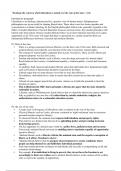"Evaluate the extent to which liberalism is united over the role of the state." (24)
Introductory paragraph
Liberalism is an ideology characterised by a positive view of human nature. Enlightenment
philosophers are given credit for shaping liberal ideas. These ideas were rst drawn together and
systematized as a distinct ideology by the English philosopher John Locke, generally regarded as the
father of modern liberalism. Classical liberalism focusses on laissez faire, free market principles with
limited state intervention whereas modern liberals believe in an interventionist state that gives equal
opportunity to all. This essay will argue that there is agreement to a certain extent but there are
fundamental differences between a classical and modern liberalist.
P1: Role of the state
• There is a strong consensus between liberals over the basic role of free state. Both classical and
modern liberals assert that the core function of the state is to protect 'natural rights'.
• The concept of 'natural rights' originated from Locke- God-given. These are life, liberty and
property (property was key for Locke).
• Friedan and modern liberals, such as Rawls, were also huge advocates for 'natural rights'.
Rawls believed Just society = foundational equality + formal equality + social and economic
equality.
• In addition, both classical and modern liberals agree that individuals have fundamental rights
such as Freedom of Speech that should be respected by the State.
• Liberals argue that we must tolerate views that we may nd offensive.
• Nevertheless, individuals have a duty to ensure that their actions do not limit the rights of
others.
• Liberals do not support speech that advocates violence as it holds the potential to limit the
freedom of others.
• This is illustrated in Mill's harm principle. Liberals also agree that the state should be
rationalist in nature.
• Liberals, such as Wollstonecraft, rmly believe that we should be allowed to express ourselves
fully as guided by our own free will rather than by outside authorities (religion, the
authoritarian state) via a rationalist education system.
P2: the size of the state
• A major area of divergence in liberalism exists in relation to the size of the state.
• Classical liberals, such as Locke, advocate a minimal or 'night watchman' state to maximise
personal freedom (negative liberty).
• To classical liberals, the minimal state respects individualism and property rights.
• They believe in a limited state that involves upholding justice and preventing incursion
from foreign powers.
• The key apparatus of a limited state would be a police force, judicial system and an army.
Conversely, modern liberals advocate an enabling state to maximise equality of opportunity
(positive liberty).
• Modern liberals, such as Rawls, criticise the minimal state and the negative conception of
liberty as it allows 'freedom to starve'.
• Modern liberals believe that the purpose of government is to create conditions where
people can help themselves and ful l their individual potential.
• State intervention provides assistance to individuals and succeeds in compounding social and
economic disadvantage.
• For example, if an individual is living in poverty they do not have the freedom to act
accordingly to their own wishes and so modern liberals believe in the creation of the welfare
state as it provides equality of opportunity.
fi fi fi fi
, • Keynes suggested gov’ts should ‘manage’/’steer’ economies by in uencing the level of
aggregate demand by ‘injecting’ demand into the economy in the hope of achieving full
employment.
• However, Classical liberals strongly oppose Keynesianism because it requires debt, or tax
rises, to pay for it.
• classical liberals see Rawls' ideas as 'illiberal', as in their view, redistribution of wealth is a
'surrender to Socialism' and collectivist thinking at the expense of the individual.
P3:
• liberals agree only to a limited extent on the role of the state.
• This is con rmed by the contrasting views that modern liberals (enabling state) and classical
liberals ('minimal' or 'night watchman' state) have in terms of the size of the state and its
institutions. Rawls' interventionist state could never be tolerated by Locke and Mill even if it
claimed to be promoting equality of opportunity.
• Crucially however, there is some limited agreement in terms of the state's role protecting
'natural rights' (Rawls and Friedan agreed on civil liberties issues) and in its overall role of
promoting individual liberty (be it as Berlin observed 'positive' or 'negative').
fi fl




